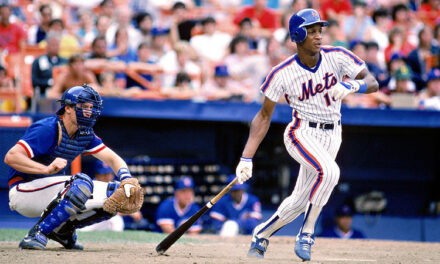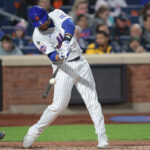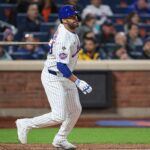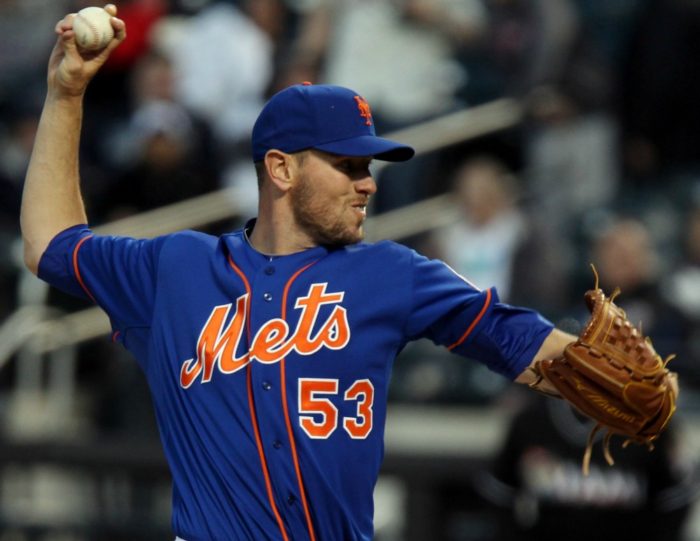
Jeremy Hefner is busy at work.
The former Mets pitcher is poring through mounds of data, dissecting numbers and preparing pitching and game plans to help the Minnesota Twins gain any advantage they can.
No, he’s not on the 25-man roster, nor the 40-man roster, as he retired from the game of baseball via a Facebook post in January 2017. The 32-year-old Oklahoma native is now onto his second career in the sport: working as an advance scout for the Twins in his second year in the role.
As an advance scout, the title says it all. Hefner prepares for the Twins’ upcoming matchups, always staying one series ahead. He formulates game plans and sorts through all the available information and video to aid in the Twins’ success on both sides of the ball.
Hefner is in a unique position where he bridges the gap between the front office and player, as he readily travels with the team and is available to further explain his reports to the coaching staff and players.
It helps, too, that Hefner’s resume includes two seasons in the big leagues, where he can relate to the players and their day-to-day grind in more than just analytics. Hefner pitched in the majors for the New York Mets from 2012-13, appearing in 50 games (36 of which were starts) and posting a record of 8-15 with a 4.65 ERA.
On a staff that featured Dillon Gee, Matt Harvey, Jon Niese and Zack Wheeler in ’13, Hefner made 23 starts, 14 of which were quality. Things seemed to be going right for the then 27-year-old, having cracked the starting rotation after making 13 starts in 2012. Even though Hefner’s right arm was giving him some soreness early on in the ’13 season, he continued to push through since his velocity was still consistent with his career norm and his breaking ball still had sharp bite.
Taking it start by start, Hefner was hopeful that if he needed any type of surgery or cleanup to his arm it could wait until the offseason.
Unfortunately, the pain worsened and so too his performance on the mound. On August 9th, Hefner would make his final big league start of the season – and of his career – before undergoing Tommy John surgery later that month.
While working back from his surgery and pitching in Minor League rehab games the following season, Hefner faced yet another setback. This time, he fractured his ulna bone, resulting in his second Tommy John surgery in fourteen months.
Reluctant at first to undergo a second surgery, Hefner and his family decided to move forward with the surgery in hopes of pitching again. He signed a minor league contract with the St. Louis Cardinals in December 2015 and made twenty-one starts for their Triple-A affiliate in Memphis.
Months after the completion of the ’16 season, Hefner announced his retirement via a Facebook post. Hefner explained in the post that for most of the season he had been dealing with a partially torn rotator cuff muscle, which would require either rest and rehab or another surgery.
Satisfied that he was able to get back on the mound after two Tommy John surgeries, Hefner was at peace with his professional baseball career coming to an end.
Using the classic proverb when one door closes, another opens, Hefner transitioned right into his new role as an advance scout for the Twins in 2017.
I had the privilege of speaking with Hefner in late August where we discussed his time with the Mets, the two Tommy John surgeries he underwent and his new job as an advance scout for the Twins.
MMO: Who were some of your favorite players growing up?
Hefner: My favorite position player was Ken Griffey Jr. Pitching wise, Curt Schilling, Randy Johnson and David Wells.
Those late ‘90s early 2000 Yankees and Red Sox teams were always on TV, and then I got all of the Braves games, too, in Oklahoma. So even a little bit before that with [Tom] Glavine, [John] Smoltz and [Greg] Maddux.
MMO: And who introduced you to the game at an early age?
Hefner: My dad, for sure. I’ll forever remember playing catch and having fun out in the yard. He and my mom would take me to games. They were big supporters throughout my career, encouraging me and teaching me the game.
MMO: At what point during your development did you hone in specifically on pitching?
Hefner: I didn’t start pitching primarily until my sophomore year in high school. I was a catcher in Little League and then in middle school I was shorter and dumpier, I guess. [Laughs.] I don’t know what the politically correct term is, maybe rounder?
I grew in-between my freshman and sophomore years, I grew six inches. I always had a good arm and then some circumstances with our team provided me the opportunity to pitch. The rest is history after that.
MMO: You were drafted twice by the Mets – first in 2004 (46th round) and then again in 2005 (48th round) – before being drafted & eventually signing with the Padres in the 5th round of the 2007 Draft.
What made you forgo signing both times with New York before eventually signing with the Padres?
Hefner: Well, one of the issues with growing a lot really quick is you don’t really have control over your body. I was a bit uncoordinated, very skinny, and needed to mature a little bit physically. The velocity was there but I didn’t really locate that well, and my off-speed pitches hadn’t really taken shape yet.
We thought it was best to start school. Back then, they still had the draft-and-follow process, so it was one of those things where I could go to junior college and do well and get back in again. Then I did but I still didn’t feel like I was quite ready.
I felt I had some maturation to do and ended up refusing both times. But I was so grateful and it’s something I look fondly on with that whole experience [being drafted by the Mets twice].
I went back to junior college for two years and ended up not getting drafted after my sophomore year. We had 13 draft-and-follows on my college team, and nine of them were pitchers. There were not very many innings to go around so that was part of the reason. I didn’t really have a bad sophomore year, we just didn’t have a whole lot of innings so I would miss scouts and it was just kind of bad luck so to speak.
I went to Oral U. and I got drafted by the Padres and ended up signing there. I gained some weight and gained some velocity over those three years. I gained a good grip on my off-speed pitches and I was fortunate enough that San Diego wanted to take me.
MMO: Sounds like holding off really helped with your development.
Hefner: For sure. Now, that’s not to say I wouldn’t have developed in the Mets’ minor league system and done all of the things I did in college. Education was important, that was a big factor in it as well. The way it worked out we thought it was best to go to school first.
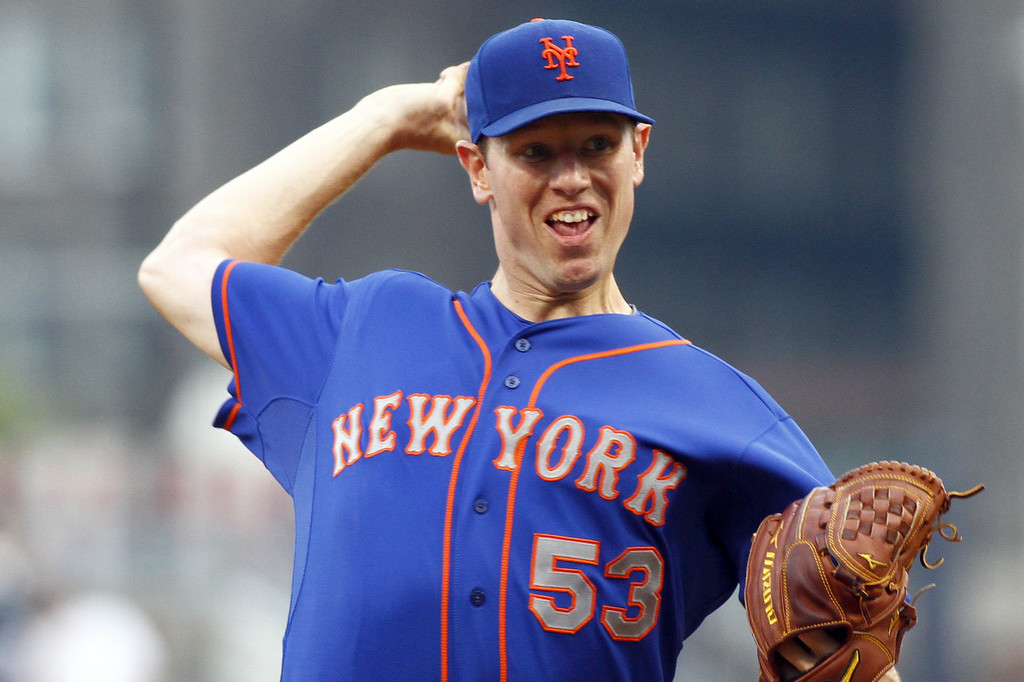
MMO: When the Mets picked you up off of waivers in 2011, was it almost like coming full circle?
Hefner: For sure! Sandy [Alderson] drafted me in San Diego and he and Paul DePodesta were both in San Diego when I was drafted. So, not only getting reacquainted with those guys but this was the team that originally wanted to give me a chance.
Yeah, it definitely came full circle when I got that phone call.
MMO: In 2012, you pitched in 10 games (9 starts) for the Buffalo Bisons with Wally Backman as your manager. He’s such a polarizing figure. I’m curious, what your impressions are of him and his managerial style?
Hefner: Wally is Wally. He’s intense and he wants to win and I’m the same way. Now, the way it manifests itself in our personalities is very different, but I am very intense and I want to win. So me and Wally got along great.
It was a good time. [Matt] Harvey, [Collin] McHugh, [Jeurys] Familia, myself and Jenrry Mejia, that was our rotation and so we were going out and beating some people up.
I didn’t really ever have a problem with Wally, I wasn’t around him a whole lot. I was only down there for maybe a couple of months, but my experience with Wally was very positive and good.
MMO: What memories do you have from your major league debut on April 23, 2012, against the San Francisco Giants at home?
Hefner: Jordany Valdespin and I got called up on the same day. We were in Lehigh Valley and I was supposed to start that night against the IronPigs. We took a town car from Lehigh to New York. That was the first time I’d ever been to New York.
The driver asked me if we wanted the scenic route or just the straight shot. I was like, ‘The scenic route! I don’t know if I’m ever going to get to come back here.’
He took us where we could see the Statue of Liberty and took us through town. It was really surreal!
Getting to the park around two hours before the game started and I’m putting my pants on and going straight to the bullpen. It was the first game of a doubleheader against the Giants, so there weren’t a whole lot of people. It was kind of a dreary, overcast, rainy day so I think that kept some people away.
Sitting in the bullpen and having not ever pitched in relief in pro ball, I didn’t really know what to do. I relied a little on Ricky Bones and talked to Dave Racaniello and Eric Langill – the bullpen catchers – and just tried to get a feel for what other guys do and just try to wing it and do the best I can.
Another piece of this is Buster Posey and all of those Giants guys I had faced coming up in the minor leagues with San Diego, so I had some familiarity which helped out a lot. But overall, just an unbelievable experience and I’m grateful I got to do it.
MMO: You had the chance to pitch alongside and watch R.A. Dickey win 20 games in 2012, and Johan Santana pitch the club’s first no-hitter in franchise history. You were also there to see the early rise of Matt Harvey and Zack Wheeler. What were your interactions like with these guys and how beneficial was it for you to get to watch and learn from the veterans like Johan and Dickey?
Hefner: Yes, for sure. Those two guys had a big impact on me, along with Chris Young. All of those guys molded me well, taught me how to be a pro, taught me how to read hitters’ swings, how to prepare in-between starts and also the day of.
To watch Johan go out and throw the no-hitter, I sat on the bench and watched him do that. I still go on YouTube and watch the end of that game just to kind of relive that moment. I got to see him the other day; the Twins inducted him into their Hall of Fame and so he was here just the other day. Getting to talk to him and reminisce a little bit about our Met days was a good time.
MMO: You were on the mound on September 26, 2012, and pitched a fantastic game against the Pirates (7 shutout innings). That was also the night David Wright became the Mets’ all-time hits leader.
What was your experience with Wright and your thoughts on him, not only a player, but team leader?
Hefner: David is one of the best teammates that I ever had. The night I made my major league debut I got sent back to Triple-A in-between games, so I couldn’t even sit in the dugout for the second game.
I remember after the second game, because I watched it in the clubhouse, David came up to me and said, “You did great today. Don’t think of this demotion like it’s going to be forever. We’ll need you the rest of the year. Go down and work your butt off and get back up here.”
That really stuck with me, just his words of encouragement. He’s a special player and it’s unfortunate what’s happened to him with all of the injuries.
For me, I’m a huge fan and I’m pulling for him. I hope that he can make it back and at least produce in some capacity to the way he was before he got hurt.
MMO: How difficult was it when doctors told you that you needed Tommy John surgery near the end of the 2013 season? How does one stay upbeat with that kind of news – especially after finally cracking the starting rotation and making over twenty starts that year?
Hefner: I kind of dealt with some elbow issues that entire year. I kind of felt like my arm was hurt early in the year but I could get through with ibuprofen and caffeine, I guess. My velocity was still good and I still had the sharpness on my breaking ball, so I didn’t want to stop throwing. I was pitching well enough to stay in the big league and I was hoping to make it to the offseason to have the surgery.
It just got to the point – right after the All-Star break – my performance started to go downhill and my elbow was really starting to bother me a lot. It got to the point that night in Arizona where I just couldn’t do it anymore. I went back to New York and they told me the news that I had a torn UCL.
I knew that the surgery faces everyone that throws a baseball or anything overhand. It’s just unnatural. So we wanted to take it head-on and we knew that I would be stronger on the other side of it. It’s just one of those things you’ve got to deal with. You try to do everything right: arm exercises, running, arm care. Sometimes it just happens.
MMO: So this was something you and the Mets were monitoring start-by-start that year?
Hefner: Yup, that’s exactly right. Just tried to take it day by day. It’s every kid’s dream to be in the big leagues so you’re going to do everything you can to stay there and so that’s kind of what we did. Icing, running, ibuprofen and medication to try and keep throwing. I was throwing fairly well.
MMO: And then of course, the unfortunate news of a second Tommy John surgery just a little over a year later. At what point did you realize that something was wrong, and what were your initial reactions to hearing you needed the second operation?
Hefner: I had the first surgery in August and by next July I was in GCL games throwing 92-94 mph like I was before the surgery, feeling good, snapping off breaking balls. I went to Daytona for my first Florida State League rehab start and it went okay. It was laborious a little bit and I think at that point is when I kind of hurt it. I didn’t really hurt like before, there was no pain. I had some weakness, I guess, and part of it is my stubbornness, I should have said something. But I thought it’ll be okay and that it was just part of the rehab process.
I ended up making a start in Clearwater that went okay, and then the third rehab start was in St. Lucie, actually against Fort Myers which is the Twins affiliate. Byron Buxton was on that team and it did not go well. My velocity was well down and I felt some looseness in my elbow.
After the first inning, I was talking to the trainer and we decided to pull me out of the game. I went to New York the very next day and got an MRI. I’d actually pulled the anchor out of my bone, so I didn’t actually rip the UCL like I did the first time. I fractured my ulna bone, which is a crazy freak thing.
At that point, I was like, ‘Nah, I’m good. [Laughs.] I think I’m going to hang it up and go be a dad and see what’s next in my life.’
I flew back to Florida, drove from St. Lucie back to Oklahoma, and spent August, September and part of October thinking through options of what we wanted to do.
We ended up deciding to go ahead and have the surgery again because I still felt like I had something to offer. I had the second surgery in early October of 2014.
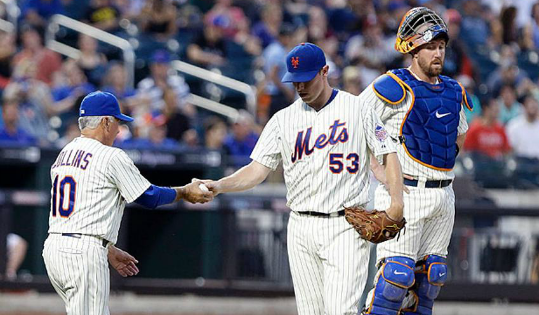
MMO: When you announced your retirement in January 2017, you said that the decision was mostly based on the fact that you were dealing with a torn rotator cuff muscle, which required rest and rehab or surgery.
First off, how is your rotator cuff now? And secondly, did being able to pitch one more season in 2016 (with the Cardinals Triple-A team) help make you feel more at peace that at least you attempted the comeback and went out on your own terms?
Hefner: For sure, yeah. To answer the first question, the rotator cuff feels great because I’m not throwing a whole lot. I play catch with my son and my daughters. It’s fine, I can do all of that. To go and try to throw 95 again, I’ve got no chance.
To answer the second part, I think it also helped me with the role I’m in now because I was 29 and all of those Cardinal kids were prospects. I don’t think there was a guy over 24, there may be a couple of 26-year-olds but it was a very young team and I was very senior to them. But it was a lot of fun to kind of get to be not a coach, but more like a mentor.
All those guys are in the big leagues now with the Cardinals, so getting to see them succeed and kind of feeling like I was a part of that was cool, too. And also getting to pitch and getting back on the mound competitively and doing well until I was hurt. There was probably an opportunity if I hadn’t gotten hurt to get called up again, which was the ultimate goal.
Sometimes you can’t control everything. I’m definitely grateful for the Cardinals organization for my time in Memphis.
MMO: Talk about how the advance scout position came about for you with the Minnesota Twins.
Hefner: I retired in January. I tried to throw but just couldn’t do it. I retired and then like three days later Jeff Pickler – who is the Twins’ director of player development and outfield coach – called me and I never met Pick before. He introduced himself and his dad is a junior college coach who’s actually going to the ABCA (American Baseball Coaches Association) Hall of Fame this offseason. He’s good friends with my coach from Oral Roberts. So Pick called Rob Walton, who was my coach at ORU (Oral Roberts University), and asked if he knew of anyone that would kind of fit this role and he said, “Hef just retired. I think he’d be great for the role.”
I refused at the beginning; I was retired. I was going to move on to some other things. But Pick has a way of persuading, so I flew to Florida and met with Derek Falvey, Thad Levine, Paul [Molitor] and the rest of the staff and kind of felt like it would be a good opportunity for me.
MMO: What does a normal day in the life of an advance scout look like?
Hefner: With the old advance scouts you’d actually go to the stadium, to where the team you’re about to play and advance and scout them. But the way that technology is now, a lot of teams have moved away from that and either go straight numbers or they’ll hire a guy like me and kind of dissect the numbers and formulate game plans and pitching reports and what the other team’s pitchers are trying to do to the hitters.
All of the stuff that the guys used to do in the stands we just have video now where you can watch a lot more, you can get more quantity, and hopefully get to a better solution, answer or report. So that’s what I do.
Right now, we’re playing the A’s [this interview was conducted in late August] and then we’ll fly to Cleveland to play the Indians. I’ll have all the reports in for Cleveland and then we go from Cleveland to Texas. So the first day of Cleveland I’ll start advancing Texas, and then so on and so forth. I’m always just one series ahead of our team.
MMO: Do you travel with the team?
Hefner: I travel with the team and the Twins felt it best for the relay of information to be with the team. That’s kind of how they set it up. I’m not exactly sure how other teams do it, I’m sure it’s similar. Talking with the coaching staff and some of the players and trying to help them out the best I can.
It is available to work from home but I’m not sure of the impact that you would have. You’re essentially just sending in a report and then leaving everyone to interpret, whereas if you’re there you can kind of help guide through questions of what did you mean here. You’re there to answer those questions.
MMO: How much do you incorporate advanced stats into your scouting, and what are your overall thoughts on how the game is becoming more analytically inclined?
Hefner: I think the game has always been analytically inclined, we just say different things now. The game has always been around numbers, right? We just have better ways of quantifying things with Trackman and all of the kitschy terms and the popular ones like exit velocity, launch angle and spin rates. We just have a different way of quantifying things. Like guys with high spin rates who throw hard, we used to just say that guy throws a heavy ball.
I’m under the belief after doing this for two years that the game really hasn’t changed that much, we just have different ways of saying things now. So yes, we do use advanced analytics in the way that we prepare and I enjoy it. I wouldn’t do the job if I didn’t enjoy it. I think it paints a better picture. It helps me game plan for the other teams, like the A’s. It’s no secret, you can get this on any public website they hit the most fly balls of any team in the big leagues. Whenever I game plan for the A’s I have that in mind.
MMO: I’m curious, what your thoughts are on the “old guard” way of scouting vs. the way in which scouting has evolved with utilizing video and incorporating these advanced metrics.
Hefner: We always talk about batting average and slugging and all of those things, the game’s always had numbers. I believe in scouts, I want to make that very clear. I’m not saying that the scouts who sit in the stands and travel city-to-city should go away. I’m very much a fan of sitting in the stands and seeing how a guy moves. If a guy can’t move well on the field but you see that if he makes certain adjustments he could be really good, but if he can’t move that well is he going to be athletic enough to make that adjustment? You can’t see that on video, you have to be in the stands to see how a guy moves.
So yes, there is an advantage to video and advantages to being in-person. I think merging the two to some capacity, and I’m not sure exactly how that works, but I’ll leave that for people who make a lot more money than me. I don’t think the old guard should go away. I think they’re extremely valuable.
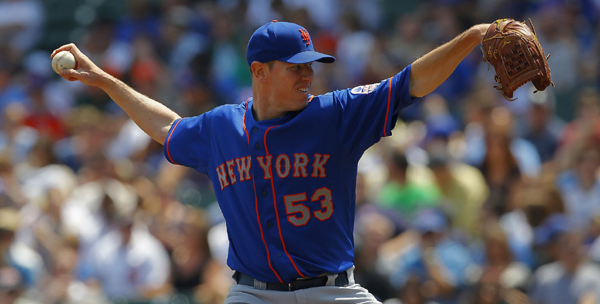
MMO: Have you come across many former big leaguers who have turned into scouts?
Hefner: Pro scouts I’m not sure. Advance scouts there was Scott Atchison – he was Cleveland’s advance scout for three years and now he’s their bullpen coach. Once he retired he kind of took the same path as me, retired pitching from Cleveland and then went straight from the big leagues to advance scouting.
Dan Haren [is another] who is doing pitching and advance reports for the Arizona Diamondbacks. There are a couple of articles on him and it’s a good read. Besides those two, I’m not sure of any ex-major leaguers but there are a lot of guys that played pro ball that are in these types of roles. Trying to bridge the front office and the field.
MMO: Would you say that there’s more of a built-in trust with what you convey to players and coaches because of the fact that you played in the majors?
Hefner: Yeah I think that’s accurate, I think there’s some built-in trust with guys that have played for sure.
MMO: Where do you envision yourself moving forward in the game? Any plans to get back in as a coach someday, or perhaps continue to work in the front office?
Hefner: I don’t know. That’s kind of the beauty of this role is you can kind of get exposed to both sides of the game. And I’ve enjoyed both sides of the game. On August twenty-fifth, I’m not entirely sure. I love players, I love being around players, you know I kind of alluded to being around younger guys in Memphis how much fun that was.
I would like to coach, but I also see value in being in a development role or continuing to write reports and be an advance scout. I really enjoy my work now, too, so I’m not entirely sure. I’m grateful for the Twins for giving me an opportunity to kind of grow and learn and learn both sides of the game.
MMO: I greatly appreciate your time today, Jeremy. It was great speaking with you and all the best going forward with the Twins.
Hefner: Likewise to you. Thank you, Mathew.
Follow Jeremy Hefner on Twitter, @jeremy_hefner53





